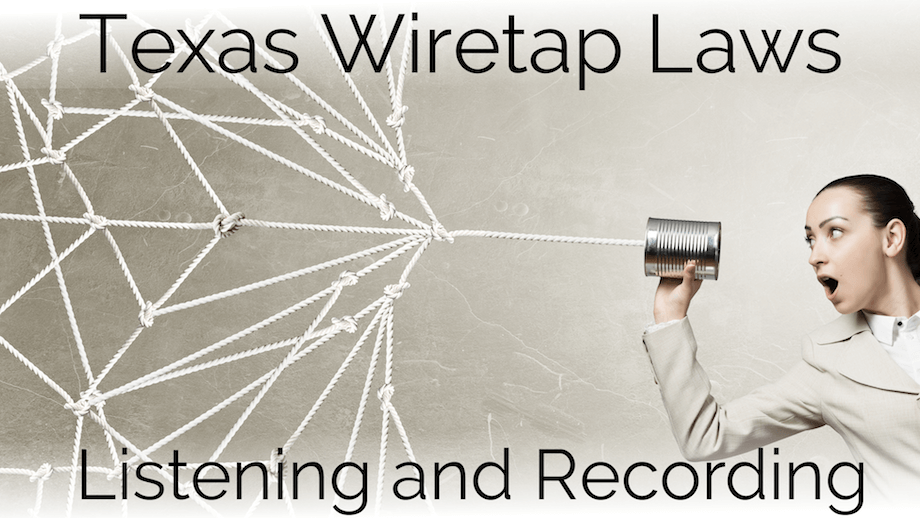
When is it legal to record a conversation in Texas?
Because of the growth of effective recording devices such as cell phones, drones, extremely small cameras, and easily concealable microphones, it is increasingly easier to record interactions between individuals. With the abundance of technology, many times conversations are recorded un-intentionally or seemingly without reason. An important question arises that many people need to be concerned about: When can I record someone without violating the law?
Wiretapping Laws in the U.S.
There are both federal and state laws, known as wiretapping laws, which limit the ability for someone to record phone calls or in-person conversations. Although they may slightly vary, states generally use two different methods for determining who is required to consent to recording: “one-party consent” and “two-party consent.” In one-party consent states, you can record a conversation as long as you are a party to the conversation. The other party is not required to know or consent to the recording. Furthermore, you can record a conversation when you are not a party so long as a conversation participant consents and has knowledge that the interaction will be recorded. In two-party consent states, consent must be obtained from every party to a conversation or phone call. Even if it involves more than two people, all parties must consent. Currently, thirty-eight states follow the one-party consent method and twelve follow the two-party consent method.
The relevant federal wiretapping law is located in
Generally speaking, it is almost always illegal to record a private conversation or calls when you are not a party, do not have consent from one or more parties, and could not naturally overhear the conversation. Furthermore, you could end up in legal trouble if you record someone while they are in another state that uses a different consent method. Thus, it is always smart to obtain consent from all parties before recording a conversation.
Wiretapping Laws in Texas
The Texas wiretapping law is found in the
Oral Communication
“Oral communication” as used in § 16.02 means any oral communication uttered by a person “exhibiting an expectation that the communication is not subject to interception under circumstances justifying that expectation.”
Electronic Communication
The statute defines electronic communication as a “transfer of signs, signals, writing, images, sounds, data, or intelligence of any nature.” Id. Thus, consent of at least one party is required to record calls, texts, photos, or virtually any other type of information sent over a cellphone, computer, or other electronic device.
Disclosure of Information
Not only can you be charged with the interception of wire, oral, or electronic communication, but you can also be charged with disclosing or using the gathered information. A person can violate § 16.02 if they intentionally disclose or attempt to disclose the contents of communication when they knew or had reason to know it was obtained through interception of a wire, oral, or electronic communication in violation of the law. § 16.02(b)(2). It is also an offense to use or attempt to use the communication contents if the person knew or was reckless about whether the information was obtained through interception of a wire, oral, or electronic communication in violation of the wiretapping law. § 16.02(b)(3).
Special Circumstances
A child’s legal guardian, such as a parent, can vicariously consent on behalf of their child to recording the child’s conversation if they have an objectively reasonable, good-faith basis for believing that the recording would be in the child’s best interest. For example, a mother may record a conversation between her daughter and another person without either the daughter or other being aware of the recording. Alameda v. State,
Many people believe that there is a special exception for recording conversations by married couples. However, this is untrue. The wiretapping law applies to interspousal relationships just as if the couple was not married. A husband that “bugs” his own home phone and records conversations between his wife and others will likely be found to have violated the Texas wiretapping law. Duffy v. State,
Warning: You can also be civilly sued

A party to a communication may sue a person who (1) intercepts, attempts to intercept, or has another intercept or attempt to intercept the communication; (2) uses or divulges information they knew or should have known was obtained by interceptions; (3) or as a landlord, building operator, or communication common carrier, either personally or through an agent or employee, aids or knowingly permits interception or attempted interception of the communication. Tex. Civ. Prac. & Rem. Code Ann.